Internet addiction and social isolation: definition, causes, relationship and preventive measures
Table of content
- What is internet addiction?
- What is social isolation?
- What are the signs and symptoms of internet addiction?
- What are the causes of internet addiction and social isolation?
- How is internet addiction associated with social isolation?
- What are the ways to prevent internet addiction and social isolation?
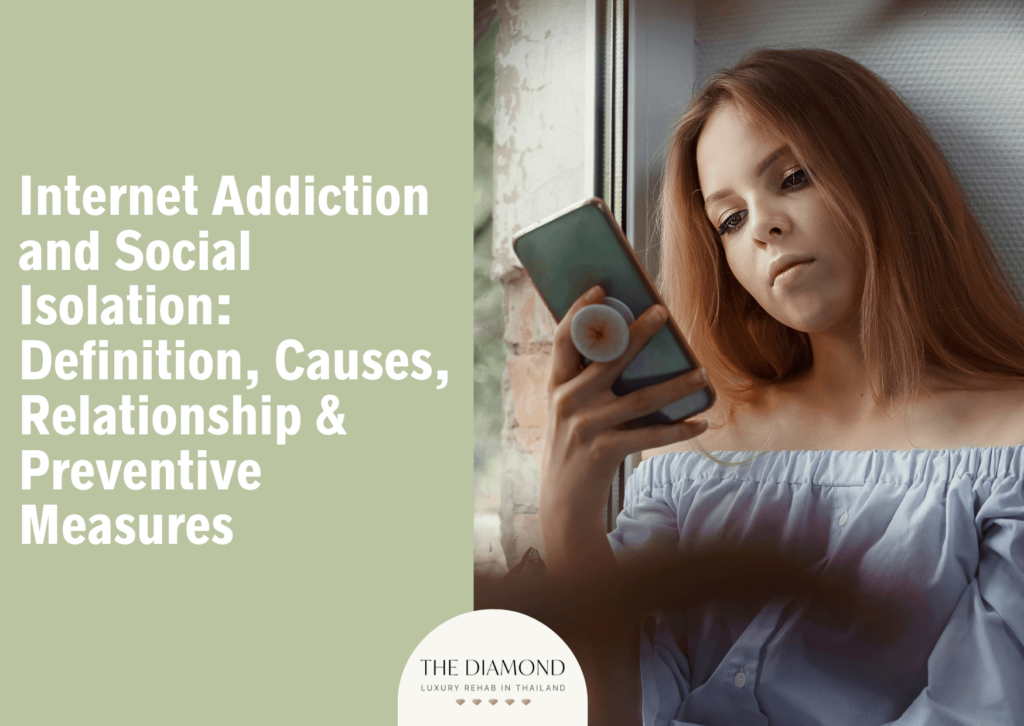
Internet addiction (IA) refers to the overuse of the internet for various activities and behaviors. Social isolation refers to a lack of social connections and a disconnection from real-world relationships. Internet addiction and social isolation often go hand in hand, as spending much time online can lead to detachment from social interactions and meaningful connections in the real world.
The causes of internet addiction and social isolation include underlying mental health problems, behavioral addictions, substance abuse, illness or loss, genetics, high stress levels, and physical conditions.
Preventing internet addiction and social isolation involves establishing defined internet usage boundaries and designated online time limits, alongside establishing a balance between internet usage and in-person connections. Engaging in group outings and sharing hobbies with loved ones also helps to avoid feelings of isolation.
What is internet addiction?
Internet addiction refers to the uncontrolled preoccupation with the internet. Addicts spend a great deal of time on the internet in such a way that it impacts their personal and professional lives.
Internet addiction is a broad term that can indicate a range of problematic behaviors and impulses, according to Natalie Hoeg in her 2023 article “Internet Addiction,” published by AddictionCenter. These problematic behaviors can be identified and diagnosed as separate disorders, such as online gaming addiction or online shopping addiction.
Internet addiction is not officially recognized in the Diagnostic and Statistical Manual for Mental Disorders (DSM-5). However, the manual does acknowledge internet gaming disorder, which could be considered a component of internet disorder.
What is social isolation?
Social isolation refers to a lack of social connections with other people. People who are socially isolated do not have a lot of people whom they can interact with regularly and might also feel emotionally detached from other people.
Social isolation is associated with higher risks for high blood pressure, heart disease, depression, dementia, and obesity, according to “Loneliness and Social Isolation — Tips for Staying Connected,” a 2021 article published by theNational Institute on Aging. People who are socially isolated might not engage in enough physical activity, consume excessive alcohol, smoke, or experience poor sleeping patterns. These factors can increase the likelihood of developing severe health problems even more.
Is social isolation and loneliness the same?
No, social isolation and loneliness are not the same. Social isolation could lead to some people feeling lonely, and other people could feel lonely without being socially isolated. Although according to the Centers for Disease Control (CDC), it’s difficult to differentiate loneliness and social isolation, and often the two terms are used interchangeably.
What are the signs and symptoms of internet addiction?
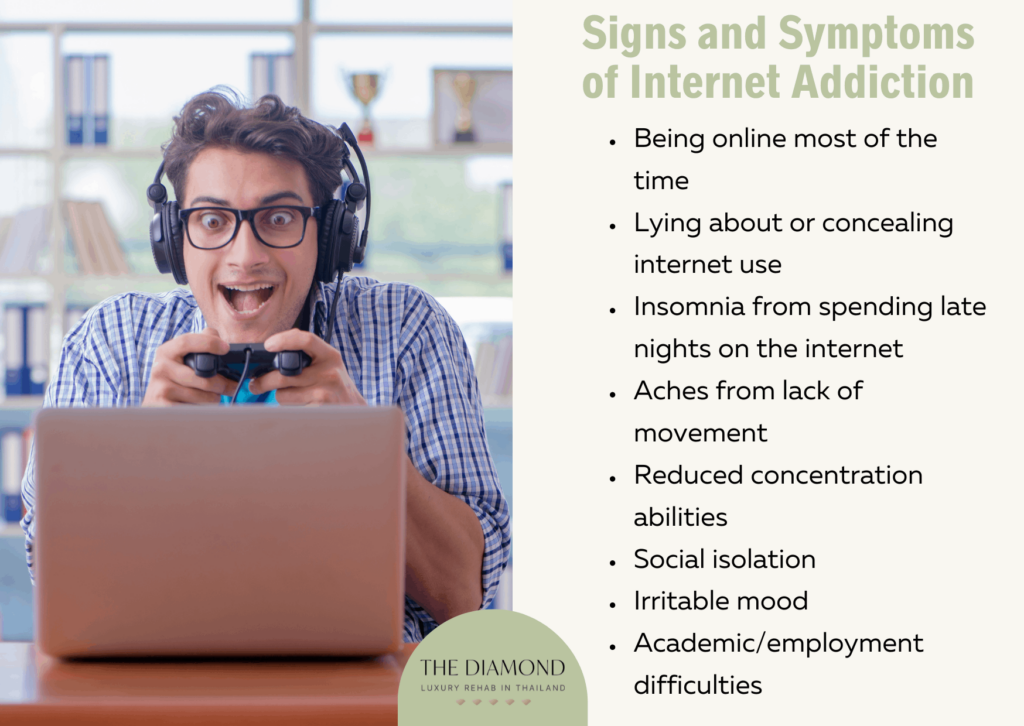
The signs and symptoms of internet addiction are listed below.
- Being online most of the time
- Lying about or concealing internet use
- Insomnia from spending late nights on the internet
- Aches from lack of movement
- Reduced concentration abilities
- Social isolation
- Irritable mood
- Academic/employment difficulties
What are the causes of internet addiction and social isolation?
The causes of internet addiction and social isolation are listed below.
- Underlying mental health condition: Mental health issues can cause people to turn to the internet to cope with their mental health struggles and social isolation, which could lead to an addictive behavior pattern.
- Illness or loss: The unexpected loss or illness of a loved one can cause people to feel socially isolated, according to Social Isolation and Loneliness in Older Adults: Opportunities for the Health Care System, a 2020 book published by the National Academies Press (US). The internet can provide escapism from the sadness of losing a loved one and people may feel a need to use it more and more to temporarily distract themselves.
- Substance or behavioral addiction: Substance abuse (e.g., drug abuse) and behavioral addictions (e.g., internet addiction) often cause a person to isolate themselves because they feel ashamed and guilty of their addiction.
- Genetics: Research by Cash et al. in their 2012 article published by Current Psychiatric Reviews indicates that there is a genetic predisposition that can raise the likelihood of internet addiction, which, when exacerbated by prolonged online activities, can potentially contribute to social isolation.
- High stress levels: High-stress levels have been linked to an increased likelihood of internet addiction as people turn to the internet to relieve their perceived stress, according to Sriati, Lukman, and Agustina, in their 2022 article published in the Malaysian Journal of Medicine and Health Sciences. As people rely on the internet to relieve their stress, they tend to spend more and more time invested online and less building real-world connections, contributing to social isolation.
- Physical conditions: Physical conditions typically limit mobility, making it difficult to interact with friends and family. People with debilitating conditions often feel ashamed of their condition and tend to self-isolate themselves to avoid embarrassment. They turn to the internet as their only source of connection with others, spending more and more time online until it develops into an addiction.
What groups are prone to developing internet addiction?
The groups that are prone to developing internet addiction are listed below.
- Adolescents: Adolescents have the highest risk of developing internet dependence (13%) due to spending copious time on the internet for their academic and social life, according to Chung et al., in their 2019 article published in the International Journal of Environmental Research and Public Health. Adolescents, young adults, and college and university students in general are more exposed and typically more capable of navigating the internet.
- People with mental health issues: There is a strong correlation between internet addiction and mental health issues such as anxiety, depression, and stress, according to Saikia et al. in their 2019 article published in the Journal of Family and Community Medicine.
- People who are socially isolated: People who spend a large amount of time isolated from others are more likely to turn to internet use to fill their time and get social connections.
What groups are prone to developing social isolation?
The groups that are prone to developing social isolation are listed below.
- People with few confidants: People who have one or less confidants with whom they can share feelings and emotions report feeling more lonely and isolated than others, according to an international survey published by KFF.org.
- Older adults: Older adults are more likely to develop social isolation or loneliness as they are more likely to live alone or lose loved ones due to illness or death.
- People with mental problems: In the U.S., 85% of people who struggle with their mental health also feel lonely, according to Kristy Rigg in her 2022 article, “Loneliness in the digital age: Heading for a “public health catastrophe”. This might be due to them feeling ashamed or embarrassed of their condition or due to a stigma in the community of their condition.
- People with physical health problems: People who suffer from debilitating physical health conditions are also 45% likely to feel socially isolated, according to a 2018 news release by KFF.org.
How is internet addiction associated with social isolation?
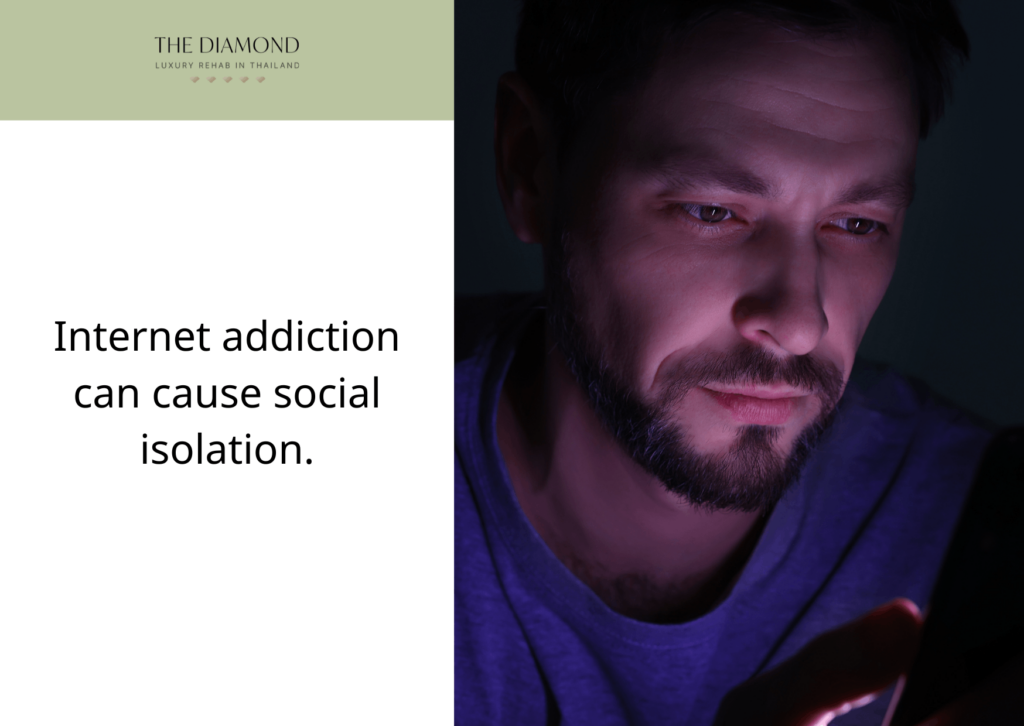
Internet addiction can cause social isolation. People who are addicted to the internet are more lonely and socially isolated than those who are not addicted to the internet, according to Saadati et al., in their 2021 article published in the SSM – Population Health Journal. This could be due to the fact that internet addicts spend an excessive amount of time online, and they neglect their social connections with friends and family.
On the other hand, social isolation can also cause internet addiction. People who are lonely are more likely to spend a lot of time on the internet. These people are more likely to develop excessive internet use behavioral patterns, as they may see it as an easy way to cope with their loneliness and interact with other people.
How does internet addiction influence the social life of a person?
An internet addiction can have a negative impact on one’s social life. An internet addiction causes a person to spend an excessive amount of time on the internet. As individuals increasingly prioritize their online activities, they may find themselves spending less time engaging with peers and family members.
This gradual withdrawal from real-world interactions can contribute to a sense of social isolation and loneliness as meaningful connections with friends and acquaintances begin to dwindle.
Are there positive effects of being socially isolated?
Yes, there are positive effects of being socially isolated. Time alone with yourself could allow for reflection on the last couple of years in terms of your job and personal life. Social isolation could also be relaxing for people who live a very busy and fast-paced lifestyle.
Taking time off from social and work commitments lets you slow down and unwind for a day or two. These quiet moments of solitude also help you plan your future goals, both in work and personal life.
Moreover, being alone often boosts creativity. Engaging in solitary activities like writing poetry or practicing a musical instrument sparks creativity. It’s a wonderful opportunity to work on neglected creative projects such as pottery, painting, composing songs, or even gardening.
How does excessive internet usage impact mental health and overall well-being?
Excessive internet usage is associated with low self-esteem, impulsiveness, poor sleep patterns, depression, suicide, and various other mental health disorders, according to Aderinto in his 2022 article published in the International Journal of Surgery: Global Health.
There is a strong correlation between a person’s mental health, quality of life, and internet usage behaviors. Thus excessive internet usage has a viable impact on one’s mental health and overall quality of life.
An internet dependency also has a negative impact on the social and physical well-being of a person. These addicts tend to lose friends and family, become socially isolated, and lose or gain weight at an alarming rate.
Is internet addiction a disorder?
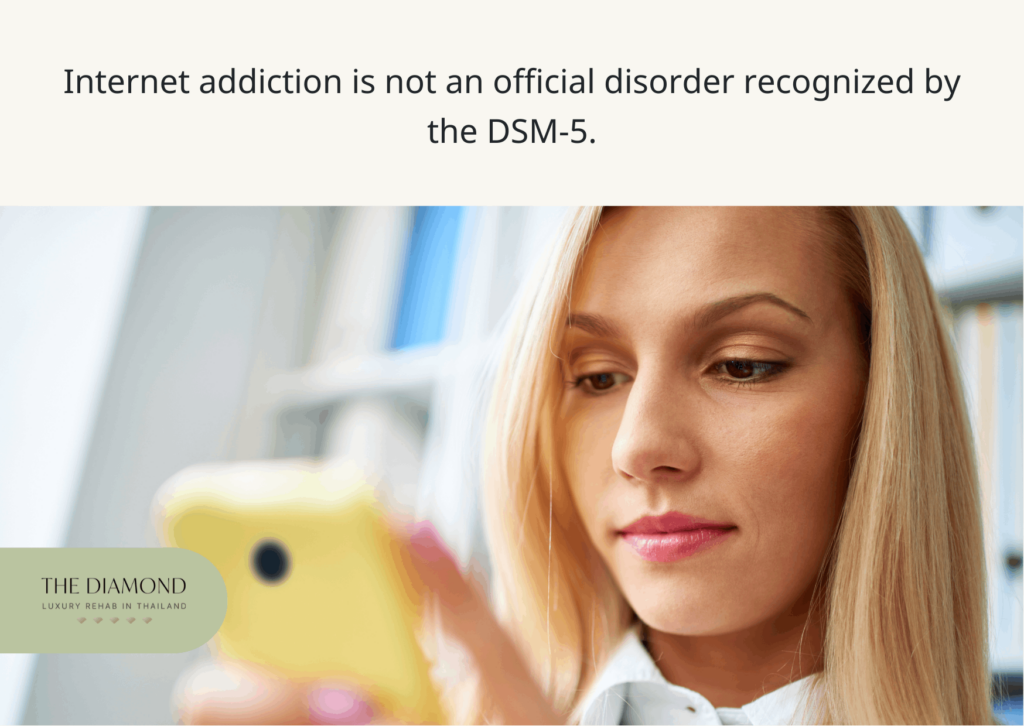
No, internet addiction is not an official disorder recognized by the DSM-5. However, it is a controversial topic in the medical field, and opinions differ. According to the Merriam-Webster online dictionary, a disorder is an abnormal physical or mental condition.
Healthcare professionals who do recognize internet addiction typically classify it as an impulse control disorder or obsessive-compulsive disorder. It is also often used as an umbrella term for other internet-related mental illness disorders, such as internet gaming disorder.
Is social isolation an illness?
No, social isolation itself is not considered an illness, but it does have substantial mental health impacts. Studies have indicated that the impact of loneliness and social isolation on one’s health could be comparable to that of obesity or smoking 15 cigarettes daily, according to Amy Novotney in her 2019 article “The risks of social isolation,” published by the American Psychological Association. Research links social isolation to a heightened dementia risk of approximately 40%, while loneliness is linked to elevated occurrences of depression, anxiety, and suicide.
What are the ways to prevent internet addiction and social isolation?
The ways to prevent internet addiction and social isolation are listed below.
- Set time limits: Clear time limits should be set on internet usage per day/per week to overcome an internet addiction.
- Schedule social plans: Plans should be made to see friends or family on a regular basis, outside of the home. It could be a public park or local coffee shop, as these public spaces expose a person to social interaction from multiple sources as well as time away from the internet.
- Find alternative activities: Discover alternative activities that one could enjoy instead of spending time on the internet. In addition, activities that could be enjoyed with family and friends could help prevent isolation.
- Stay in touch: Regularly video call or text family members to catch up on life events and news.
How can social media platforms contribute to feelings of isolation?
Social media can significantly contribute to feelings of isolation and loneliness. A 2023 article published by Regis College titled “Does Social Media Create Isolation?” states that social media can lead to feelings of social isolation by exposing users to unrealistic or distorted portrayals of their friends and family’s lives.
In addition to distorted portrayals, excessive use of social media can also lead to the fear of missing out (FOMO) and feeling excluded, thus, increasing feelings of isolation. Despite this, the convenience of social media has led to the development of social media addiction. Social media addiction typically develops as people spend hours per day on social media platforms in search of a real connection to friends and family.
What are the negative effects of social isolation?
The negative effects of social isolation are listed below.
- Mental health issues: Social isolation is associated with an increased risk of developing mental health issues, such as depression and anxiety. These mental health issues can, in turn, increase feelings of loneliness and isolation.
- Substance abuse disorder: People who are isolated may feel more anxious and stressed than usual, which makes them seek immediate relief. Stress or anxiety can be momentarily alleviated through drugs or alcohol, thus possibly developing substance abuse.
- Physical health issues: Social isolation causes an increased risk of developing high blood pressure, heart disease, stroke, or obesity. Isolation can also worsen the prognosis of individuals already struggling with heart issues, according to a 2022 article, “Social isolation, loneliness can damage heart and brain health,” published by the American Heart Association.
- Memory loss issues: People, especially older adults, who are socially isolated, have a 50% likelihood of developing dementia, according to a 2021 article, “Loneliness and Social Isolation Linked to Serious Health Conditions,” published by the CDC.
- Sleep issues: Individuals who are socially isolated tend to have poor sleeping patterns or get insufficient sleep. In a 2021 study published in Sleep Science, Escobar-Córdoba et al. state that nearly one-third of individuals who suffer from social isolation also suffer from insomnia.
Are there any positive aspects of internet usage that can counteract the negative effects of social isolation?
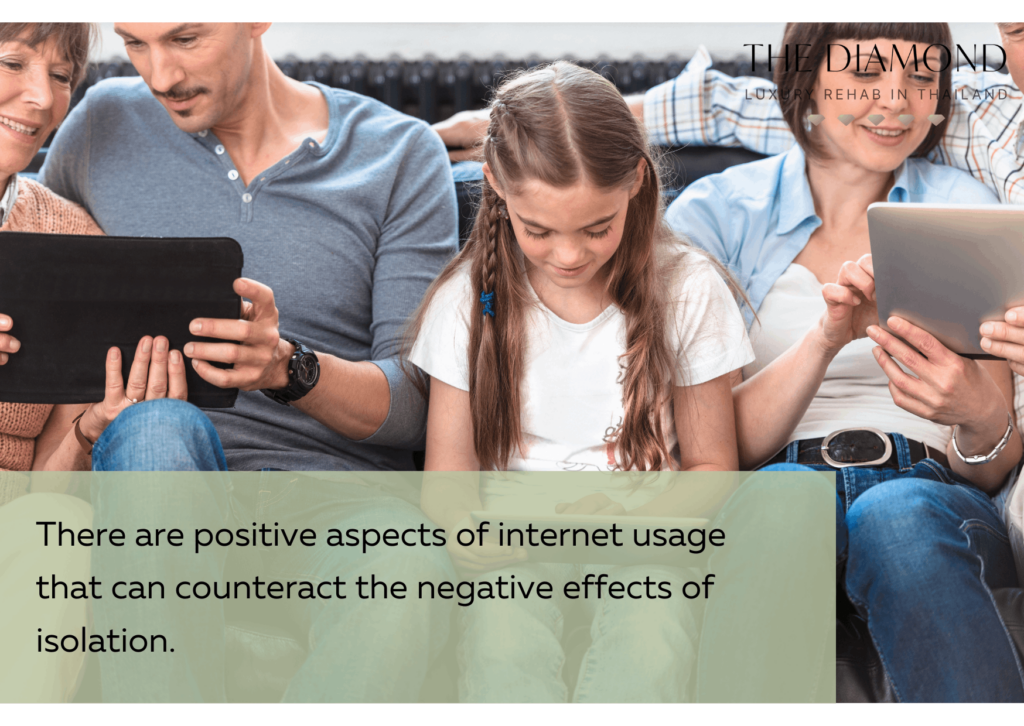
Yes, there are positive aspects of internet usage that can counteract the negative effects of isolation.The internet allows people to keep in touch and keep up with friends and family across any distance. Before the internet, this was not possible with the same convenience and speed.
The internet can be used to connect with others, build relationships, and build communities, which can help to counteract the negative effects of social isolation.
What is the difference between normal introversion and social isolation?
Introversion is a personality trait, whereas social isolation refers to a lack of social connections. Introverts find comfort in moments of solitude, using them as an opportunity to recharge and reflect. They have a circle of friends and acquaintances with whom they do engage, but they also value the peacefulness that comes with being alone. While they may not be very talkative, their attentive listening skills make them trustworthy companions who can provide support and guidance when discussing worries and issues. Normal introversion is common as introverts make up between 25% – 40% of the population, according to Kendra Cherry in her 2022 article, “8 Signs You’re an Introvert”, published on Verywell Mind.
On the other hand, social isolation is often observed in individuals who are facing mental or physical issues. For many, isolating themselves becomes a way to escape the pressures of life. Those struggling with anxiety and depression may withdraw from interactions to protect themselves from the expectations of others. Similarly, individuals dealing with addiction or alcoholism might choose isolation because they feel ashamed about their actions, making it difficult for them to maintain relationships.

